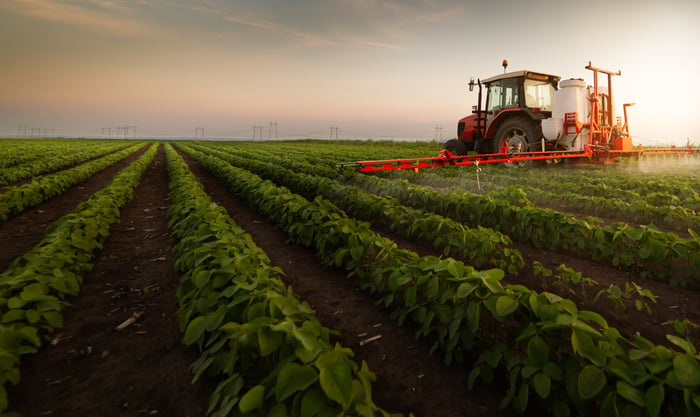When most people think of John Deere (DE -0.14%), the term "artificial intelligence" usually isn't the first (or even the fifth!) thing that comes to mind. But the company known for its iconic tractors has been on the leading edge of technology and innovation in agriculture for decades. Here's why the unlikely contender is becoming one of the world's most important AI businesses.
A brand that just keeps running
Throughout its 180-year history, John Deere has built an impressive brand as the premier manufacturer of farming and industrial machinery. Its reputation for high-quality products and unmatched service has become arguably one of the company's greatest competitive advantages – and maintaining it is a central part of Deere's strategy.
Technology and automation have long been crucial in helping Deere provide best-in-class products. In the 1990s, John Deere acquired a GPS start-up called NavCom to build a satellite-directed guidance system for tractors. The company then partnered with NASA (yes, the NASA) to create the world's very first internet-based GPS tracking system.

Image source: Getty Images.
During this time, John Deere also created its Intelligent Solutions Group (ISG), an internal innovation team of data scientists and software engineers responsible for developing and implementing advanced technology solutions and processes across the business. In 2017, John Deere acquired Blue River Technology, a company that develops AI and computer vision solutions to power autonomous agriculture robots, which marked another important step in developing the next generation of Deere's farming equipment.
Today, John Deere sells numerous vehicles, tractors, and other smart equipment that target each phase of the farming process. These next-generation machines offer embedded technology, from guidance systems and hand-free driver assistance, to seed placement and customized spraying applications, that leverage AI to exponentially increase efficiencies, enabling farmers to produce more with less work and at a lower cost. For example, John Deere's autonomous "See and Spray" system reduces herbicide use by 77% on average using machine learning and vision processing technology to identify and spray weeds with unrivaled precision. This not only saves farmers money, but also increases productivity and reduces food waste by accidentally killing fewer primary crops.
John Deere has also successfully parlayed its advantage as the pioneer of cutting-edge, digitally enhanced farming equipment into a robust offering of software and agricultural data systems. These systems, which include its cloud-enabled telematics system, JDLink, and its A.I.-based data platform, John Deere Operations Center, allow farmers to connect and manage all the machines on a farm from a single interface, and provide them with access to robust farm-related data. This data helps farmers determine how to best utilize equipment, and what crops to plan where and when to produce the greatest yield with the least amount of waste. Today, John Deere has amassed a large network of more than 440,000 connected machines that use their core underlying technologies and leverage their centralized platform.
Plowing forward through challenges
By successfully combining its best-in-class hardware with cutting-edge software, data, and expertise, and as the first in the industry to provide customers machine connectivity and data sharing at no additional cost, without making farmers pay subscription fees, John Deere has helped customers get more done at a lower cost while bolstering its brand reputation and competitive advantage. This network effect will become increasingly important as farms become more technologically advanced, and more farmers seek a consistent line of products with integrated software and data.
John Deere's next generation of products and services – and the premium it's been able to charge for them – have led to impressive financial results. Combined with its scale and vast dealer network, which drives both initial equipment sales and a subsequent stream of revenue from those products' ongoing maintenance, Deere has been able to generate and maintain significant margins relative to competitors throughout various cycles. Its EBITDA margin of 18.6% sits well above the sector median of 10.9%, and its 16.6% operating income margin is more than double the sector median of 7.7%.
However, equipment manufacturers broadly have encountered increasing inflationary pressures and rising raw material costs resulting from the Russia-Ukraine war. Moreover, rising fuel and fertilizer prices are expected to significantly hurt farmers, which could force them to scale down equipment upgrades in the coming years.
Despite all that, John Deere increased its 2022 annual net income forecast to between $6.7 billion and $7.1 billion, predicting that "demand for farm and construction equipment will continue to benefit from strong fundamentals." Additionally, John Deere's established network of connected machines and its pricing power will likely enable the company to better mitigate any longer-term impacts of these challenges relative to its competitors.
Green fields ahead for John Deere
John Deere spent $1.5 billion, or roughly 3.6% of net sales and revenues, on R&D in 2021 alone. Though that percentage has shrunk over the past few years, Deere has increased R&D investment for 2022 by a massive 17%, highlighting the company's commitment to modernizing agriculture broadly in the coming decades. Earlier this year, John Deere debuted its fully autonomous tractor at the Consumer Electronics Show (CES) in Las Vegas, and although it likely won't be ready until the end of this year, it will certainly be a long-term growth driver for the company.
By 2050, the global population is expected to grow to close to 10 billion people, with a more than 50% increase in food demand. That makes productivity and efficiency in farming and food production more important than ever. As the leader in developing sophisticated data and technology to help drive efficiencies and cut waste in farming and food production, John Deere will be key to the long-term equation of feeding the world, and thus is poised to become one of the most important AI companies in the world.





